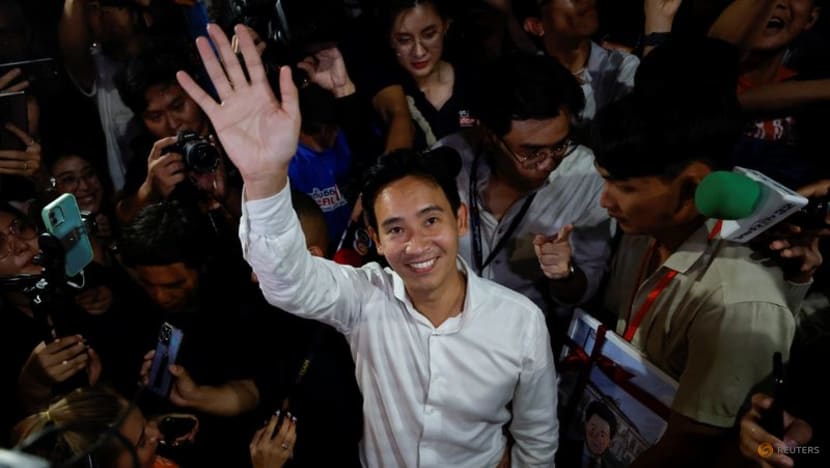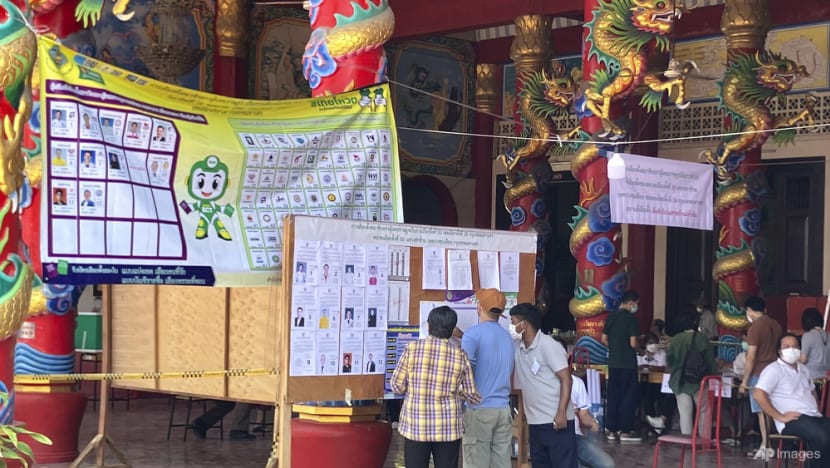FAQ: What is the state of play in Thailand as Move Forward attempts to form the government?
As Pita Limjaroenrat works to cobble together a coalition, what’s the role of the Senate and could the military still have a role in the government?

Move Forward Party leader and prime ministerial candidate, Pita Limjaroenrat, waves to the crowd during the general election in Bangkok, Thailand, May 14, 2023. REUTERS/Jorge Silva
BANGKOK: “It is clear that the people of Thailand have expressed their will at polling stations to make the Move Forward Party come first in the general election,” party leader and prime ministerial candidate Pita Limjaroenrat stated on Monday (May 15).
“I would like to announce here that the Move Forward Party is ready to lead the forming of the future government.”
Preliminary results of Thailand’s general election held on Sunday indicate that opposition parties Move Forward and Pheu Thai have prevailed against parties linked to the previous administration.
The election was to pick 500 members of the House of Representatives, which is the parliament’s lower house.
Despite garnering the most seats in the House of Representatives, it is not guaranteed that Move Forward will be able to form the next government and end the nearly nine-year rule of General Prayut Chan-o-cha.
Here’s what you need to know about the current state of play in the Thai political scene:
WHO WON THE MOST SEATS?
According to the Election Commission of Thailand (ECT), more than 75 per cent of 52 million eligible voters cast their votes on Sunday. It was the highest turnout ever. As of Monday, the ECT has counted about 99 per cent of the votes.
The preliminary results show that Move Forward has won 151 seats, followed by Pheu Thai with 141 seats. Coming in at third place is the Bhumjaithai which won 70 seats.
Palang Pracharath Party, which is the party of deputy prime minister Prawit Wongsuwon, secured 40 seats.
Gen Prayut’s United Thai Nation party had 36 seats, while the country’s oldest party the Democrats won 25 seats.
The southern-based Prachacat secured nine seats.

WHAT’S NEXT?
The election commission will need time before announcing the official results. In the previous election in 2019, the official result was announced weeks after the polls.
In the meantime, political parties are expected to hold negotiations to form a ruling coalition.
On Monday, Move Forward’s Mr Pita declared that he was ready to be the kingdom’s prime minister, with his party working towards the formation of a majority government.
Speaking at a press conference at his party’s headquarters, he said he would seek to build a coalition with five other parties, including Pheu Thai. The latter has indicated it is willing to join a coalition led by Move Forward.
The other parties are Prachachat, Thai Sang Thai and the Thai Liberal Party.
Together, they have 308 seats, which is enough to form a majority government in the 500-member House of Representatives.
The Move Forward Party is also in talks with the Fair Party, Mr Pita said. If the negotiations go well, the total number of seats held by the coalition would be 309.
WHAT’S THE ROLE OF THE SENATE?
According to the constitution, the prime minister will be elected by the House of Representatives and the 250-member Senate, which is the upper house of parliament.
Gen Prayut has been in power since 2014 when he led a coup and toppled a democratically elected government.
In 2019, the National Council for Peace and Order (NCPO), which is the military government led by Gen Prayut, selected and appointed the current 250 senators in the upper house.
A prospective prime minister must be approved by more than half of the combined assembly.
Therefore, the military-backed senate is powerful as it could sway the choice of a prime minister.
This means the ruling coalition needs to gain at least 376 votes – either from the House of Representatives and the Senate or only from the lower house for its candidate to win the premiership.
COULD THE MILITARY STILL BE PART OF THE GOVERNMENT?
Historically, the military has played an important role in Thai politics. The king of Thailand is the head of the Royal Thai Armed Forces.
In the previous election in 2019, Pheu Thai won the most seats and announced a seven-party alliance with Future Forward. Move Forward is a successor to the now-disbanded Future Forward.
However, Pheu Thai failed to form the government after all but one senator – Senate speaker Pornpetch Wichitchonchai – voted for Gen Prayut’s premiership.
While it is too early to tell how the Senate might influence the outcome this time round, a political, economic and development lecturer at Thammasat University noted that Move Forward has clearly stated that it would not form a coalition with a political party that is backed by the military.
In terms of electoral pledges, there are stark differences between Move Forward and the military-backed parties.
Mr Virot Ali noted that for instance, Move Forward wants to amend section 112 of the Thai Criminal Code. Also known as the lese-majeste law, it stipulates that whoever defames, insults or threatens the king, the queen, the heir-apparent or the regent shall be punished with imprisonment of three to 15 years.
However, Gen Prayut, among others, has said that section 112 should remain as it is.
Therefore, Mr Virot Ali predicted that the military-backed senate would likely not vote for a prime minister from Move Forward. “This could lead to a stalemate,” he said.
On Monday, Mr Pita said during his press conference that the senators should respect the wishes of the people.
“It is time for the 250 senators to think and decide their stance, whether they would listen to the people's wish. If they care about the people, there will be no problem."
Additional reporting by Vee Intarakrug.


















